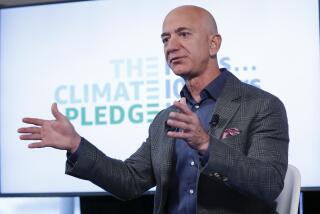Short-Term Savings, Long-Term Headaches
- Share via
This time it’s Bill Gates himself who is repeating the mantra that Microsoft never hurt consumers, and that it is only consumers who will suffer if the corporation is forced to make Windows compatible with competitors’ software.
If previous court rounds are any indication, many consumers and most economists will side with Gates. Most consumers don’t want to struggle with installing different software programs. And economists generally argue that unlike Standard Oil and other monopolies of the past, which were bad for consumers, monopolies of the present are good for consumers.
What’s amazing about all this is that the 1890 Sherman Antitrust Act was not passed to protect consumers, and the monopolies of the past were not bad for consumers. At least not according to Sen. John Sherman. “Corporations tend to cheapen transportation, lower the cost of production and bring within the reach of millions comforts and luxuries formerly enjoyed by thousands,” he told his colleagues on the Senate floor when introducing his eponymous bill.
Even the mother of all monopolies, Standard Oil, wasn’t bad for consumers. Or so believed journalist Henry Demarest Lloyd, Standard Oil’s staunchest enemy and the person who more than any other was responsible for the agitation that resulted in the Sherman act. When Lloyd exposed Standard Oil’s many tricks, his article created such a scandal that the Atlantic Monthly had to reprint its March 1881 issue five times.
Standard Oil, Lloyd had discovered, obtained lower freight rates from the railroads while insisting that the same discounts not be given to its competitors. This, of course, was unfair but not to consumers. The price of kerosene that consumers paid actually went down.
Perhaps even more stunning to contemporary readers of Lloyd’s article is the fact that by today’s standards, Standard Oil wasn’t even unfair to its competitors. The president of the Pennsylvania Railroad Co. offered to mediate between the independent oil producers and Standard Oil. If they joined the trust they would get the same rates, he suggested.
Isn’t such a buyout every entrepreneur’s dream? It wasn’t then.
“More American than he,” Lloyd reported, “they refused.”
One refiner described the meeting this way: “We gave him very distinctly to understand that we didn’t propose to go into any ‘fix up,’ where we would lose our identity, or sell out, or be under anybody else’s thumb.”
In 1894, Lloyd retold the Standard Oil story in book form, calling it “Wealth Against Common Wealth.” This time his focus was Samuel van Syckel, an innovative refiner. John D. Rockefeller wanted to buy him out and offered him a comfortable lifetime salary and shares in Standard Oil, but Van Syckel would not sell. “I want to make oil,” he told Rockefeller, becoming the hero of Lloyd’s book. Once again consumers were not the issue.
The newspapers joined the push for antitrust legislation on behalf of producers. The public agreed and Sherman responded to the outcry. The “single object” of his bill, he told the Senate, was to protect “industrial liberty.” Could he have said it any more plainly?
The dominance of Microsoft, not only in operating systems but also in office products, is a matter of convenience, not technological necessity. It is the result of consumers’ need to communicate with each other and of Microsoft’s bold exploitation of this need. As Assistant Atty. Gen. Joel Klein persuasively argued in the trial phase, Microsoft deliberately makes its products incompatible with the products of other manufacturers. This forces consumers to choose the same products--Microsoft’s.
Consumers do not seem to mind. But rival producers do.
Of course, protecting competitors may come at some cost to consumers, because with different manufacturers involved, compatibility glitches are bound to occur. If manufacturers have a legal duty to avoid them, their incidence will be low, but there is no doubt that some inconveniences are bound to remain.
Nevertheless, if this is the price that we have to pay as consumers to maintain the opportunity for all of us to become entrepreneurs, it is a very good deal indeed. The competing interests of both consumers and producers must be weighed, because there is more to life than consumption.
More to Read
Inside the business of entertainment
The Wide Shot brings you news, analysis and insights on everything from streaming wars to production — and what it all means for the future.
You may occasionally receive promotional content from the Los Angeles Times.










